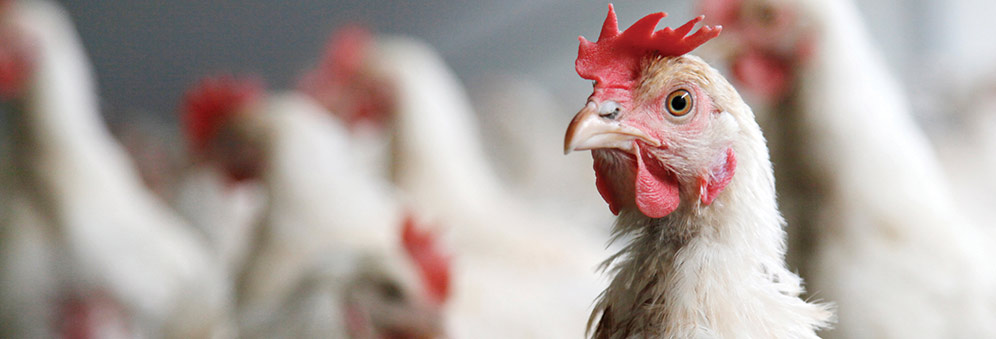Raising welfare standards improves meat quality in poultry
Research into water bath and gas stunning techniques raises welfare standards and improves meat quality in commercial poultry slaughterhouses.
Chickens are processed for the food industry in commercial plants across the UK and Europe in huge numbers. Research carried out at the University of Bristol has addressed welfare issues and resulted in more humane stunning techniques, whilst also improving meat quality.
Research funded by the Department for Environment, Food and Rural Affairs (DEFRA), and conducted by Dr Mohan Raj and Dr Michael O’Callaghan in the Bristol Veterinary School, showed that water bath stunning protocols, commonly used in commercial poultry slaughterhouses, result in poor welfare in chickens during slaughter.
Dr Raj and Dr O'Callaghan established the parameters that are necessary to adequately stun chickens prior to slaughter. These findings were subsequently included in European regulations regarding the protection of animals at the time of killing and in the standards prepared by the World Organization for Animal Health (OIE).
Dr Mohan Raj is a member of the Animal Health and Animal Welfare Scientific Panel of the European Food Safety Authority (EFSA), which evaluates and reviews scientific information to provide independent advice on animal welfare. Recently, the EFSA has published four scientific opinions regarding monitoring of welfare of animals at slaughterhouses and a guidance on studies into evaluation of new stunning methods.
Ongoing welfare benefits
There have been significant welfare benefits as a result of Bristol’s research. The University has initiated training courses for Animal Welfare Officers, who coordinate and ensure animal welfare standards are implemented in slaughterhouses. The courses are now available across Europe and have ensured that Bristol’s research findings are made clear to the people directly responsible for controlling the stunning parameters.
However, the conflict between bird welfare and meat quality in the electrical water bath stunning systems has demanded further research into alternative stunning methods.
It was found that the complexity of the electrical water bath stunning method is not conducive to maintaining high welfare standards and achieving good meat quality. With funding from DEFRA, Dr Mohan Raj and colleagues researched and developed controlled atmosphere stunning of poultry using gas mixtures. This solution eliminates all the welfare concerns associated with electrical water bath stunning, and improves meat quality. Following this research several gas mixtures have been approved for use in slaughterhouses by the European Union and the OIE.
Related research groups
Related publications
Scientific Opinion on monitoring procedures at slaughterhouses for poultry
 Study Veterinary Sciences
Study Veterinary Sciences
Join cutting-edge collaborative research from across the Faculty and beyond.
